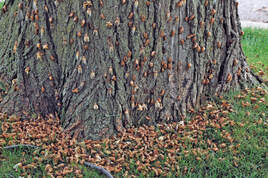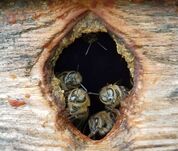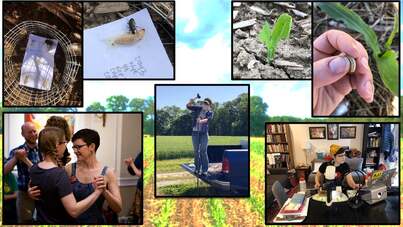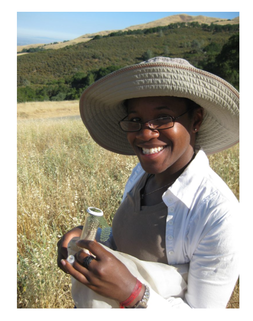|
Written by: Mike Nan
Dr. Karen Hales is a Biology Professor at Davidson College who employs genetic tools with the fruit fly (Drosophila melanogaster) model to understand the molecular mechanisms of mitochondria function in cells. While past colloquium speakers have presented on the latest research in their lab, Dr. Hales addressed an even more pressing, teaching topic: Enhancing inclusivity in undergraduate science courses through careful wording of course-specific material concerning gender identity, disability, and race.
"Maryland is at the epicenter of the cicada emergence, so there will be spectacular numbers of cicadas emerging very heavily, starting perhaps in early May," Michael Raupp, Prof Emeritus at UMD, told WJLA. "But the big ‘cicada-palooza’ is going to happen the last two weeks of May and into early June. So in some areas, there will be 1.5 million cicadas per acre emerging from the ground."
WJLA article: 'Cicada-palooza' is coming. Maryland will be at the epicenter Katie Reding and Leslie Pick’s paper, High Efficiency CRISPR/Cas9 Mutagenesis of the white Gene in the Milkweed Bug Oncopeltus fasciatus has been chosen for GSA journals’ 2020 Spotlight Collection of research and scholarship. The collection curated by the editors showcases noteworthy examples of genetics and genomics investigations. Congratulations to the Pick Lab for this exciting recognition!
Visit the collection here: https://academic.oup.com/genetics/pages/spotlight More on the article: Entomology graduate student Katie Reding (Pick lab) used CRISPR/Cas9 to make a genomic deletion of the white gene in the milkweed bug Oncopeltus fasciatus. The white gene was one of the first genes identified in Drosophila, over 100 years ago, where it is necessary for the red eye color of flies. Interesting, in Oncopeltus, white is necessary for pigmentation throughout the body but it is also necessary for organismal survival, as animals homozygous for the white mutations do not survive to adulthood. This is the first demonstration that CRISPR is effective in Oncopeltus. Methods Katie developed will be useful for researchers to test the function of other genes in this and related species.
 In the spring, trillions of periodical cicadas are expected to emerge. "They will be a source of wonder and consternation as they emerge from the earth and lay eggs in treetops.” writes Prof. Emeritus Mike Raupp in Tree Care Industry Association Magazine. Ento Grad Students Place in Mid-Atlantic Fruit and Vegetable Convention Research Competition2/11/2021
Exciting news out of Hooks Lab!
Congratulations to Veronica Yurchak & Demian Nunez who placed 1st and 2nd, respectively in the Graduate Student poster contest held during the Virtual Mid-Atlantic Fruit and Vegetable Convention. The judging panel saw 24 poster entries in total, and our students posters stood out as top. Award winning posters listed below. Title: Using a living mulch in reduced tillage sweet corn Authors: Veronica Yurchak, Alan Leslie and Cerruti RR Hooks Title: Developing a perennial living mulch system for Mid-Atlantic cantaloupe growers. Authors: Demian Nunez, Macarena Farcuh, Karin Burghardt and Cerruti RR Hooks  photo credit: Katy Evans photo credit: Katy Evans Katy Evans, PhD student in Espindola Lab, co-authors new publication w/ Penn State researchers, "The Role of Pathogen Dynamics and Immune Gene Expression in the Survival of Feral Honey Bees" out in Frontiers in Ecology and Evolution earlier this month. Their research shows feral colonies may have higher tolerance to pathogens than managed honey bee colonies. Understanding environmental and genetic factors behind the feral bees' increased immunity could help beekeepers combat colony losses. For more details about the study, check out Penn State's press release. |
Categories
All
Archives
June 2024
|
Department of Entomology
University of Maryland
4112 Plant Sciences Building
College Park, MD 20742-4454
USA
Telephone: 301.405.3911
Fax: 301.314.9290
University of Maryland
4112 Plant Sciences Building
College Park, MD 20742-4454
USA
Telephone: 301.405.3911
Fax: 301.314.9290



 RSS Feed
RSS Feed




